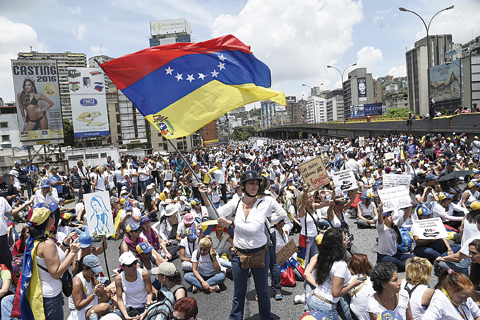 CARACAS: Venezuelan opposition activists take part in a women’s march aimed to keep pressure on President Nicolas Maduro, whose authority is being increasingly challenged by protests and deadly unrest, on Saturday. —AFP
CARACAS: Venezuelan opposition activists take part in a women’s march aimed to keep pressure on President Nicolas Maduro, whose authority is being increasingly challenged by protests and deadly unrest, on Saturday. —AFP
CARACAS: Thousands of women dressed in white marched in Venezuela's capital Saturday to keep pressure on President Nicolas Maduro, whose authority is being increasingly challenged by protests and deadly unrest. Led by opposition leaders, lawmakers and Lilian Tintori - the wife of jailed opposition leader Leopoldo Lopez - the crowd carried flowers and placards denouncing "repression".
Police and soldiers initially prevented it from reaching the interior ministry. But the women - led by several lawmakers - eventually made it to the interior and justice ministries. "We are not going to be off the streets until we have set Venezuela free," conservative opposition leader Maria Corina Machado said. "We beg the armed forces: don't open fire on unarmed people." Some women flashed their breasts in a pacifist move as some alongside Machado waved posters reading: "We have no firearms; just t**s."
Similar anti-Maduro rallies took place in other cities, including San Cristobal and Aragua, where police fired tear gas canisters against marchers. Protests Saturday night in Los Nuevos Teques, on the outskirts of the capital, and Barquisimeto in the country's west descended into clashes between demonstrators and the military. It was not immediately known if there were casualties. More protests are set for Sunday with musicians and other celebrities marching to remember the dead.
The demonstrations were the latest in more than a month of anti-government protests, many of which have been countered by pro-Maduro crowds and security forces. The death toll since April - when the protests intensified after Maduro's administration and the courts stepped up efforts to undermine the opposition - is at least 36, according to prosecutors, with hundreds more injured.
Chavez statue toppled
The last death in Venezuela's unrest, of a 22-year-old man, occurred Friday during looting in impoverished Venezuelan cities hardest hit by a worsening economic crisis. In Valencia, where he died, some areas looked like disaster zones with bars on shop windows bent and windows broken. Demonstrators blame Maduro for the country's plight and the shortages of food and medicine. They are demanding elections to remove the leftist president.
Maduro, backed by the Venezuelan military, is resisting. He and the opposition have blamed each other of using armed groups to sow violence. The president has started a process to rewrite the current constitution enacted under his late predecessor and mentor Hugo Chavez. The opposition and many protesters say his real aim is to dodge elections. Maduro supporters also marched in Caracas, railing against what they called "violence by terrorists," Minister for Women Blanca Eekhout said. "We are out here pushing for justice against those who are encouraging hatred and rage," she said, warning, "they are trying to set the stage for civil war."
The conference of Catholic bishops issued a statement quoting Pope Francis as expressing concern about the "dead, wounded and detained" in the protests and asking both sides to look for "negotiated solutions."
US tone sharpens
Maduro and his officials say the crisis rocking the country is a US-backed conspiracy designed to topple him and install a right-wing government. The United States, which had remained relatively quiet over the situation in Venezuela, is now taking a stronger tone against Maduro's "violent crackdown on protestors". The US ambassador to the UN, Nikki Haley, said in a statement that his "disregard for the fundamental rights of his own people has heightened the political and economic crisis in the country."
She called for the immediate release of "political prisoners," including Lopez, who has been "held on trumped up charges by the government since 2014". Haley also raised the issue of Venezuela's detention of an American citizen, Joshua Holt, arrested in Caracas nearly a year ago on what US media said was false evidence planted by police. - AFP




